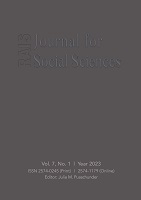Examining Bias-Sentencing and Recidivism of Minorities in South Texas: A Case Study Data Analysis
Examining Bias-Sentencing and Recidivism of Minorities in South Texas: A Case Study Data Analysis
Author(s): DeJante Eaton, Jack PhanSubject(s): Education, Criminal Law, Sociology, Criminology, Gerontology
Published by: Scientia Moralitas Research Institute
Keywords: Recidivism; Sentencing; Criminal Justice Reform; Bias; Disparities; Gender; Race; Education Level; Prior Conviction; Probation/Parole; Revocation;
Summary/Abstract: Bias sentencing is subjective sentencing. This case study evaluated sentencing disparities based on gender, race, education, prior conviction(s), prior probation/parole, and prior revocation may effectually contribute to criminal justice reform. The investigator examined the available evidence on how the experience of incarceration impacted the probability that formerly incarcerated individuals would re-offend. Based on an initial examination of peer-reviewed quantitative data, the investigator theorized that a central aspect of bias in multi-racial and multi-ethnic societies is equal treatment under the law without regard to race, ethnicity, or gender. Prison overpopulation and astronomical incarceration costs have become a financial burden for many states. The favor of probation and parole is a critical component of the criminal justice system. There are more probationers than parolees, prisoners, and jail inmates combined. The disparities in probation revocations contribute to the disparities in incarceration. Few studies carefully examine racial and ethnic disparities at this decision point. The perception of bias plays a crucial role in the revocation rates for Black probationers, coupled with the risk assessment scores and criminal history being significant factors in revocation. Furthermore, this case study aims to build upon previous research on risk factors influencing sentencing and enhance the wealth of literature on predictive bias in sentencing and recidivism. This case study has practical implications for federal and state-level sentencing guidelines considering the risk factors that influence action and those (risk) factors that are unalienable to diminish prison recidivism rates in South Texas.
Journal: RAIS Journal for Social Sciences
- Issue Year: 7/2023
- Issue No: 1
- Page Range: 21-28
- Page Count: 8
- Language: English

